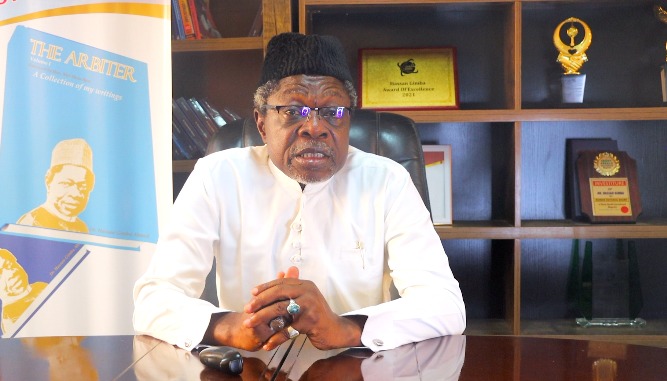HBD Buni, The Leader Who Forfeited His Inheritance For Peace, By Hassan Gimba (1)
Last week, while the battle against a new security threat, the Lakurawa, and a £25,000 marriage were shaping national discourse amidst excruciating economic difficulties, an extraordinary gentleman with qualities Nigeria could greatly benefit from celebrated his birthday. Honourable Mai Mala Buni, the Governor of Yobe State, turned 57 last Tuesday. Relatively young, God has entrusted him with leadership.
If it were a fairy tale, his story might have begun with: “Once upon a time, in the not-so-sleepy village of Buni Gari, a child of destiny was born to the industrious family of Alhaji Bukar and Hajiya Khadija.”
Born on 19th November 1967—a date that later became International Men’s Day, observed by over 57 countries to celebrate men and their sacrifices for family and nation—Buni embodies the values celebrated on this day. Fittingly, the day’s liturgical colour is blue, one of Buni’s favourite colours.
He is a man who washed his hands clean from an early age and began dining with kings while his peers were still struggling to find their footing.
There is a popular saying that some people are born great, some achieve greatness, and some have greatness thrust upon them. Buni is a man blessed with infinite patience, which perhaps inspired God to entrust him with the ability to shoulder the burdens of others, thereby achieving deep empathy over time. Mamman Mohammed, his Director-General of Press and Media Affairs, aptly described him as “a personification of humility, an embodiment of courtesy, a gentleman par excellence, a leader with listening ears and very humane.”
His father, a highly successful and wealthy businessman by local standards, passed away when Buni was just 17. His experience epitomised the usual rancour associated with disputes among relatives over estates left behind by prosperous deceased individuals. The family could not resolve the matter, so it was taken to court. Buni bore most of the pressure as the eldest child, as the judge had to rely on his testimony to shape the judgment. Owing to his close relationship with his father and the high regard his late father held him, his input was needed because it was to play a crucial role in resolving the case.
Maybe we need to know a little about him and why the case rested on him to resolve.
After completing his primary education at Buni Gari Central Primary School in 1979, Buni attended Government Secondary School, Goniri, where he obtained his West African Examination Council Certificate (WAEC) in 1985. What stood out was that as a result, his father purchased a tipper truck and stationed it in Goniri to transport sand and other commodities. The proceeds provided young Buni with a weekly allowance of ₦5. At that time, ₦5 was enough to buy a ram and still leave change for snacks and drinks.
Consequently, his ‘corner’ in the school dormitory became a social hub. According to childhood accounts shared by Mamman Mohammed, “his generosity began very early in life. His friends had unrestricted access to his wardrobe, taking clothes, caps, food, and shoes without fearing any complaints from Buni. This generosity made him a magnet for friends, schoolmates, and later, political associates.”
Buni was known for reaching out to people beyond his immediate environment and expanding his friendships. Those who know him often say that he never feels fulfilled when there is no one to help or share with. One fellow governor once eulogised him as “Dogo mai hanun kyauta” (the tall man with a generous hand).
Returning to the court case, both sides of the family conflict tried to win him over. On the day of reckoning, with thick silence enveloping the courtroom and expectant eyes on him, he approached the dock and stood attentively as the case was introduced.
It was perhaps during this moment that Buni’s habit of listening carefully, digesting what he hears, and weighing his responses thoughtfully was formed. After hearing the arguments, he asked the judge, “Can a person forfeit their inheritance?”
Upon receiving an affirmative response, Buni calmly declared, “I have forfeited mine.”
The courtroom erupted in astonishment, and the judge had to hammer the gavel repeatedly to restore order.
“Young man, do you know what you are saying?” the judge asked.
“Yes,” Buni replied, “insofar as it will bring peace to our family.”
The judge, moved and impressed, said, “Allah Ya yi ma albarka” (May Allah bless you). From that moment, Buni’s reputation as a peacemaker was firmly established.
However, this episode alone does not fully encapsulate his extraordinary qualities. Buni is a man blessed with power and wealth—the two most sought-after possessions—yet remains grounded in humility, generosity, and grace. Beyond serving others, he is driven by an unrelenting desire to empower them, as we shall explore further.
Hassan Gimba, anipr, is the publisher and CEO of Neptune Prime.




